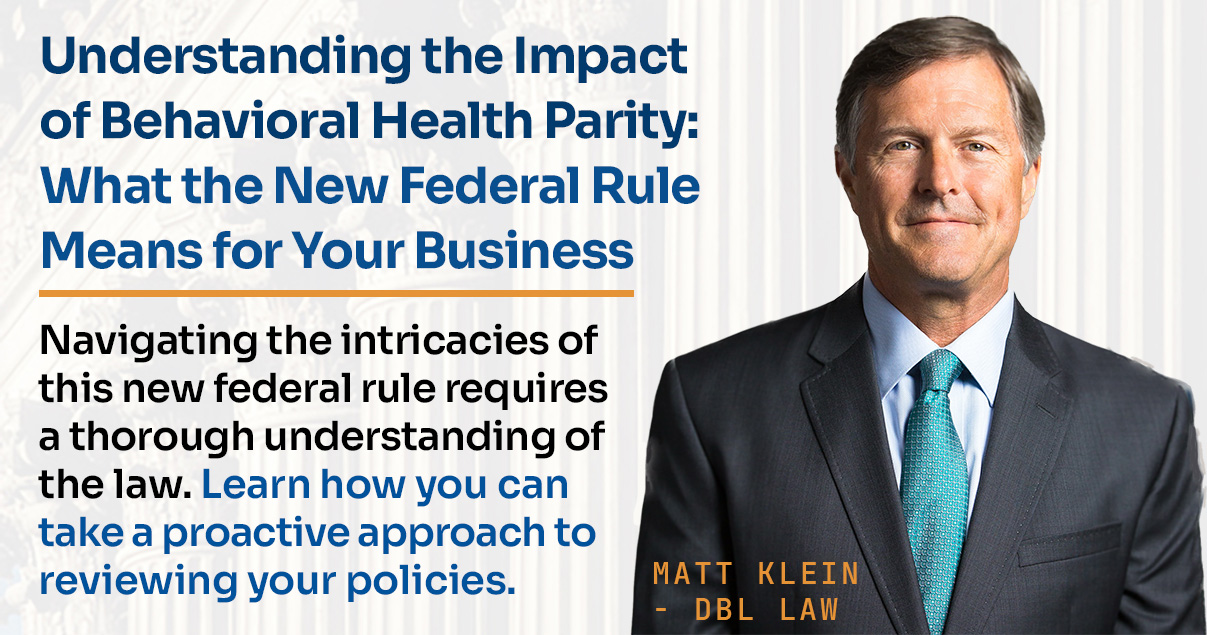The Biden administration recently introduced a transformative federal rule aimed at reshaping the landscape of behavioral healthcare coverage. This rule underscores the critical need for parity between mental health and substance use disorder (SUD) benefits and medical/surgical benefits in group health plans and insurance policies. As healthcare providers, insurers, and employers adapt to this shift, understanding the legal implications of these changes is essential.
Key Provisions of the Final Rule
- Enhanced Regulation of Non-Quantitative Treatment Limitations (NQTLs): The rule mandates that Non-Quantitative Treatment Limitations (NQTLs) applied to behavioral health services must align with those imposed on medical/surgical benefits. This includes policies such as prior authorization requirements, reimbursement rates, and network adequacy standards. For instance, insurers cannot impose stricter pre-approval requirements for mental health services than for physical health treatments.
- Mandatory Data Collection and Analysis: Insurers are now required to collect, analyze, and disclose data demonstrating compliance with parity requirements. This includes ensuring that any disparities in treatment limitations are identified, analyzed, and corrected. Failing to meet these requirements could expose insurers to legal challenges and regulatory penalties.
- Transparency and Disclosure Obligations: Insurers must provide clear information about the criteria used to determine medical necessity and the processes for developing NQTLs. Employers and providers should anticipate heightened scrutiny of their coverage policies and procedures.
Legal Implications for Key Stakeholders
- Healthcare Providers: Providers should prepare for reduced administrative burdens, such as fewer prior authorization requirements for mental health and SUD treatments. However, they must also ensure compliance with documentation and reporting requirements related to the rule.
- Insurers: Insurers face potential litigation risks if they fail to comply with the parity requirements. This includes lawsuits from plan participants or enforcement actions from regulatory bodies. Legal counsel should be engaged to audit policies and ensure compliance.
- Employers: Employers offering group health plans must verify that their plans adhere to these new requirements. Failure to comply could result in penalties, including fines and reputational harm.
- Patients: Patients stand to benefit from improved access to behavioral healthcare services. However, legal recourse may be available if parity violations occur, highlighting the importance of patient education on their rights.
Industry Reactions and Future Considerations
While provider advocates and mental health professionals have largely praised the rule as a significant step forward, insurers have expressed concerns about increased operational costs and the administrative burden of compliance. Employers should expect that the cost of adapting plans to these new requirements may be passed on through higher premiums.
Legal challenges to the rule are also a possibility, particularly as insurers and employers navigate the complexities of implementation. Stakeholders should remain proactive in addressing compliance to mitigate risks and avoid costly disputes.
Why Legal Expertise Matters
Navigating the intricacies of this new federal rule requires a nuanced understanding of healthcare law. The obligations imposed by the rule are complex, and non-compliance can result in substantial financial and reputational consequences. Healthcare providers, insurers, and employers should consider taking a proactive approach to reviewing and adjusting their policies.
How DBL Law Can Help
At DBL Law, our health care attorneys specialize in guiding clients through regulatory changes. We provide tailored legal solutions to ensure compliance with evolving federal requirements, mitigate risks, and safeguard your operations. To learn more about how this new rule impacts your organization, contact Matt Klein or any of DBL Law’s health care attorneys today.





